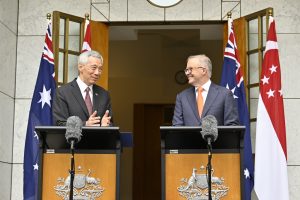Singapore’s Prime Minister Lee Hsien Loong met today with his Australian counterpart Anthony Albanese in Canberra. The two leaders signed a landmark green economy agreement bracketed by paeans to the depth and breadth of their nations’ bilateral relationship.
Lee was in Australia this week for the seventh Australia-Singapore Annual Leaders’ Meeting and met Albanese for the first time since the Labor leader became prime minister in May. He was accompanied by Foreign Minister Vivian Balakrishnan, Trade and Industry Minister Gan Kim Yong, and other government officials.
In a joint statement released at the close of the Leaders’ Meeting, the two leaders “welcomed the strength and depth of bilateral relations between the two countries, anchored in shared strategic and economic interests.”
During a subsequent joint press conference at Parliament House in Canberra, Lee said that the two leaders “affirmed our comprehensive strategic partnership,” and said that bilateral cooperation “has proceeded apace, even during COVID-19.” He added that in a “troubled world,” it was “important for like-minded countries to work together.”
A centerpiece of Lee’s trip was the signing of the Singapore-Australia Green Economy Agreement, which Albanese said signaled a “collective resolve to confront challenges as we transition our economies to net zero.” Characterizing this as “the first such agreement of its kind,” Lee said that it would “support the transitions of our countries to net zero emission and at the same time boost growth and create jobs in the green sectors.” Albanese celebrated the agreement between “two great friends” as an “important example to the world” and a “new chapter” in the comprehensive strategic partnership that was established in 2015.
The agreement will ensure greater collaboration between the Australian government research agency CSIRO and Singapore’s Agency for Science, Technology and Research, and strengthen supply chains of critical resources between the two countries.
As the above paragraphs suggest, Lee’s trip abounded in warm language about the past, present, and future of bilateral relations. Former Australian Prime Minister Tony Abbott once described Singapore and Australia as “natural partners,” and it is logical that the Lion City would form the centerpiece of the current Australian government’s promise to deepen and expand its engagements with the nations of Southeast Asia. Singapore’s Foreign Minister Vivian Balakrishnan repeated Abbott’s phrase when hosting his Australian counterpart Penny Wong in July, when he also referred to the two nations’ “huge reservoir of strategic trust.”
Albanese, the eighth Australian prime minister that Lee has met since taking office in 2004, said yesterday that the ties between Singapore and Australia “are underpinned by deep levels of trust, mutual respect, and the ability to talk frankly with each other.”
The reasons for this closeness are not hard to discern. Since Singapore’s birth as an independent state in 1965, the two nations have shared broadly congruent interests, from a shared opposition to communism to strong support for a continued robust U.S. security presence in Asia. From an Australian perspective, it would be naïve to deny that the relative cultural familiarity of Singapore, as an economically advanced, English-speaking nation, has also facilitated the establishment of closer ties.
The two nations also have strong defense ties, and Singapore is one of the few countries that regularly sends its forces to be trained on Australian soil. During today’s joint press conference, Lee said that Singapore’s armed forces would offer support to the Australian defense forces in their efforts to relieve communities that have been deluged by the recent floods. On top of these cultural and strategic alignments, Singapore is Australia’s largest trading partner in Southeast Asia, and its fifth-largest trading partner overall.
As Gatra Priyandita wrote this week for The Strategist, the house publication of the hawkish Australian Strategic Policy Institute, however, the language of uplift conceals issues on which the two nations differ, if not disagree openly. As he noted, whereas Australia has generally signaled its support for the U.S. government’s goal of curbing and containing the influence of a rising China (at least in part due to its own attempted coercion by China), Lee, drawing on Singapore’s distinct brand of small-state realism, has called on both China and the U.S. (and by extension, Australia), to make mutual accommodations.
There were glimpses of this in today’s press conference. When asked about the U.S. government’s recent restrictions on the sale of semiconductors and chip-making equipment to China, Lee expressed ambivalence. He said that while “national security concerns are real,” he said that Singapore worried that these considerations “may trigger further consequences and may result in less economic cooperation, less interdependency, less trust and, possibly, ultimately a less stable world.”
Another area of difference concerns China’s (possibly quixotic) bid to join the Comprehensive and Progressive Agreement for Trans-Pacific Partnership trade agreement, which Singapore supports but about which Australia is more skeptical. “I think Australia knows what it is doing and we understand each other’s point of view,” Lee said. When asked for his views about the Albanese government’s China policy writ large, he said, “we never give ourselves report cards, much less our friends.”
At the same time, compared to the differences of perception that Australia has with the remaining nations of Southeast Asia – one thinks here of its perpetually fraught relationship with Indonesia, forever subject to Australian promises of renewal and re-engagement that never quite eventuate – Canberra and Singapore are relatively aligned on most key issues. Indeed, whatever their differences on the question of China, they remain a good deal closer than every other nation in the region, bar perhaps the Philippines.
If Australia is seeking a “like-minded” partner in Southeast Asia, it is unlikely to find one that fits that bill to a greater degree than Singapore.

































